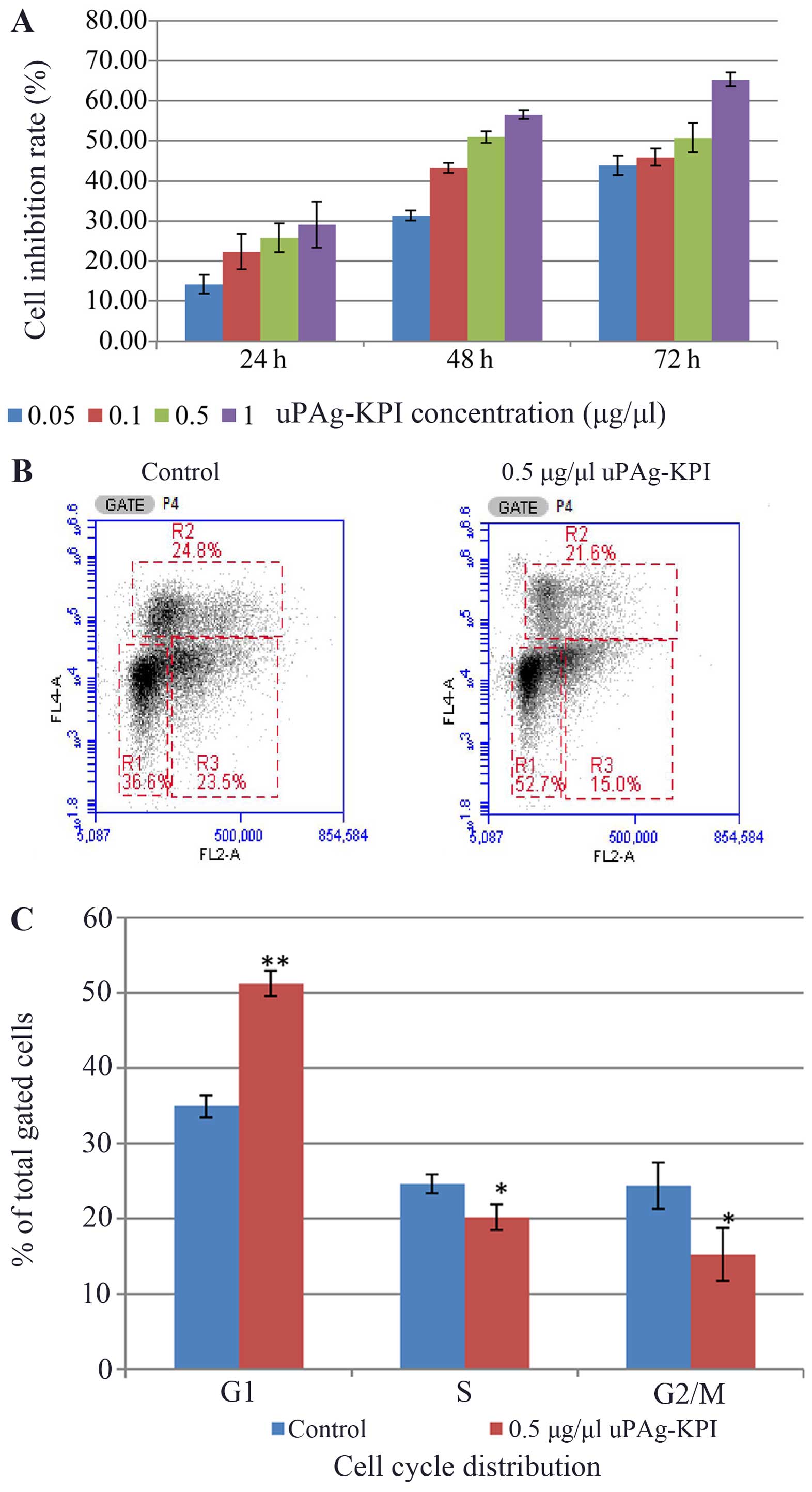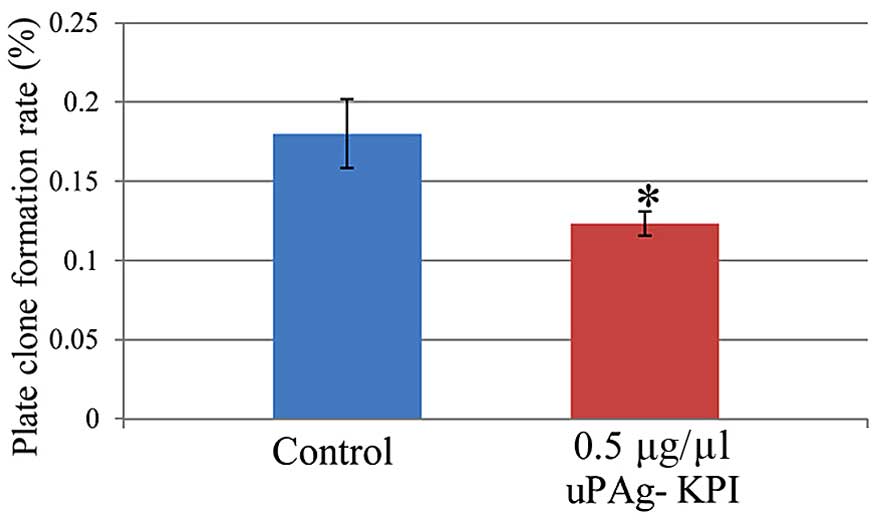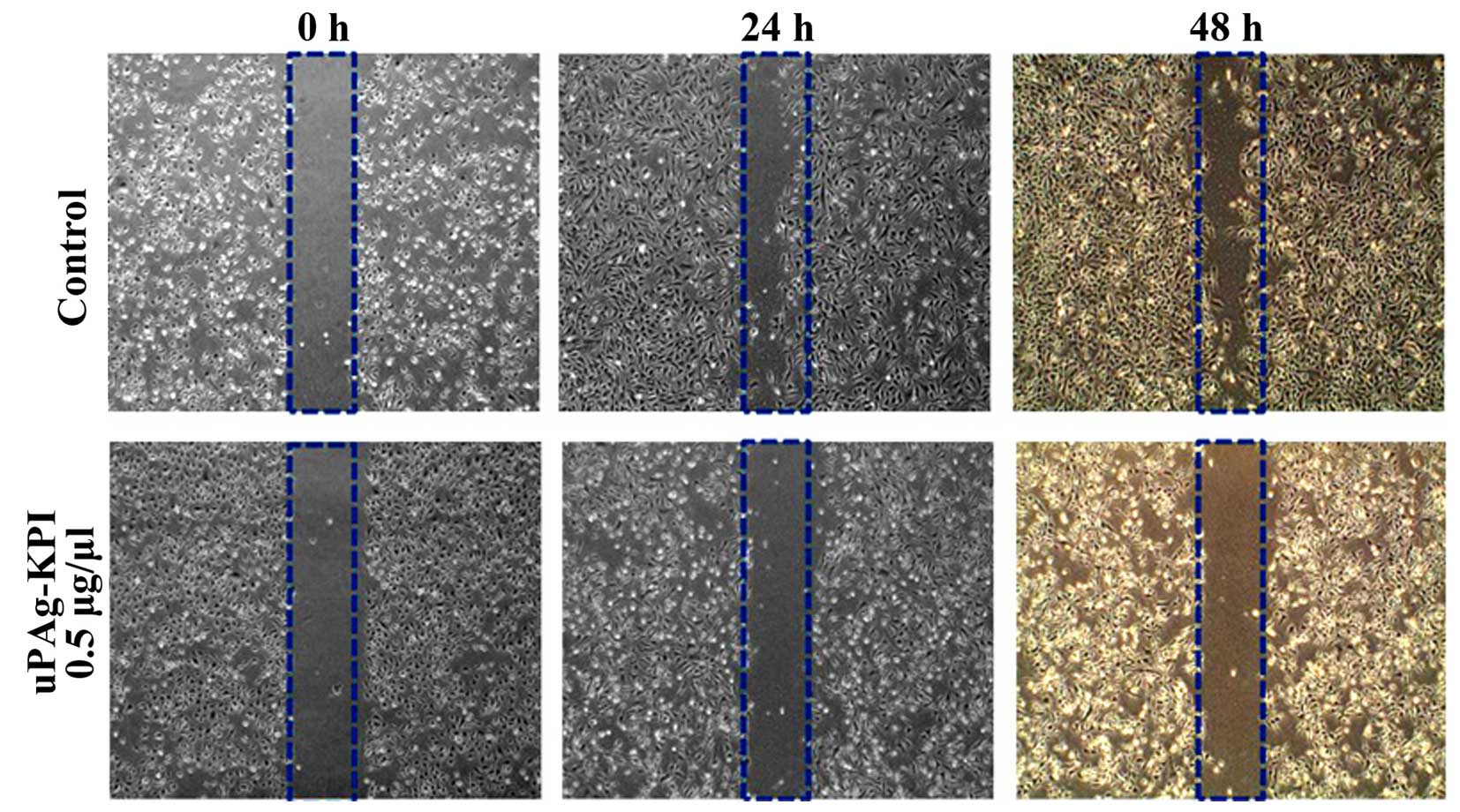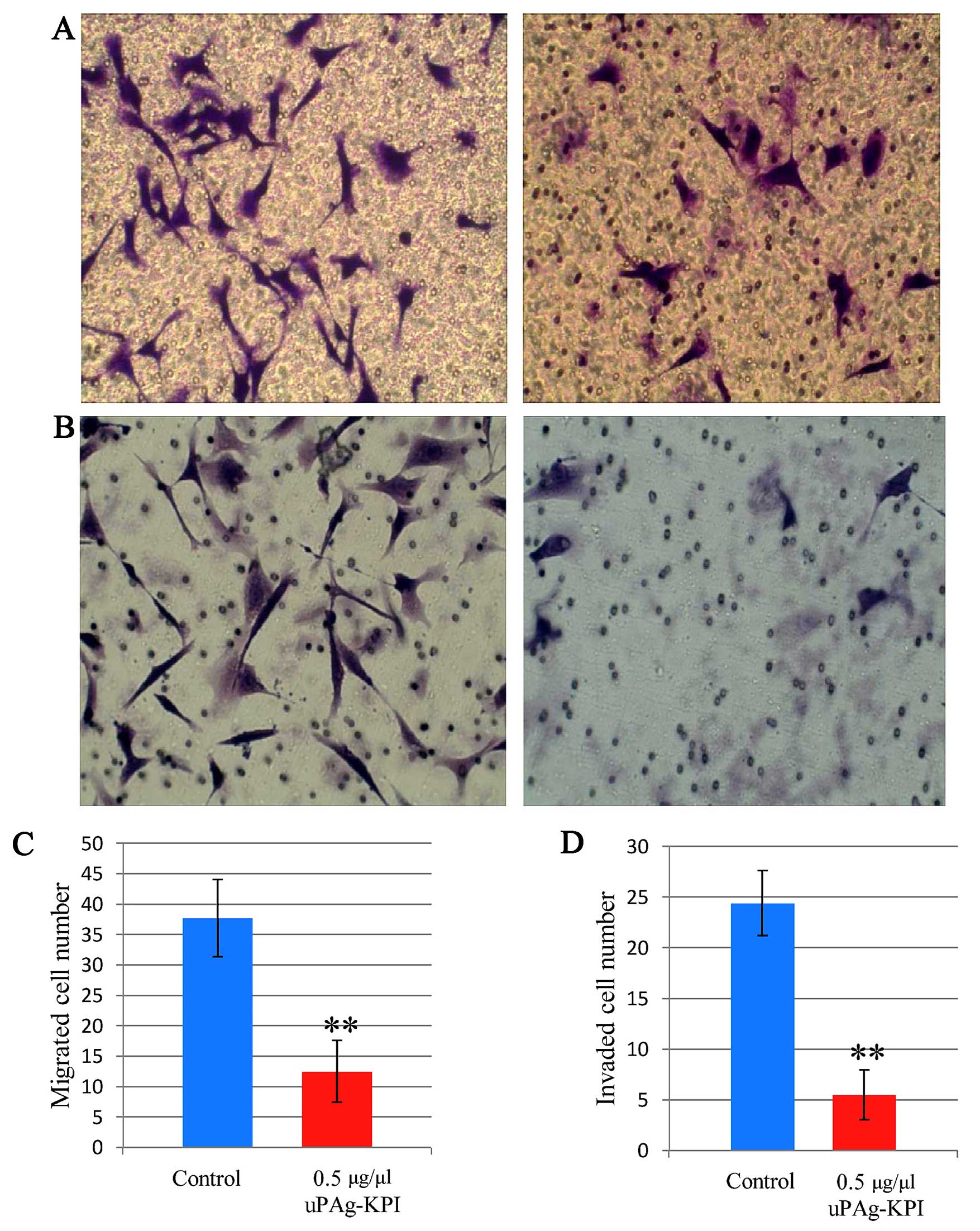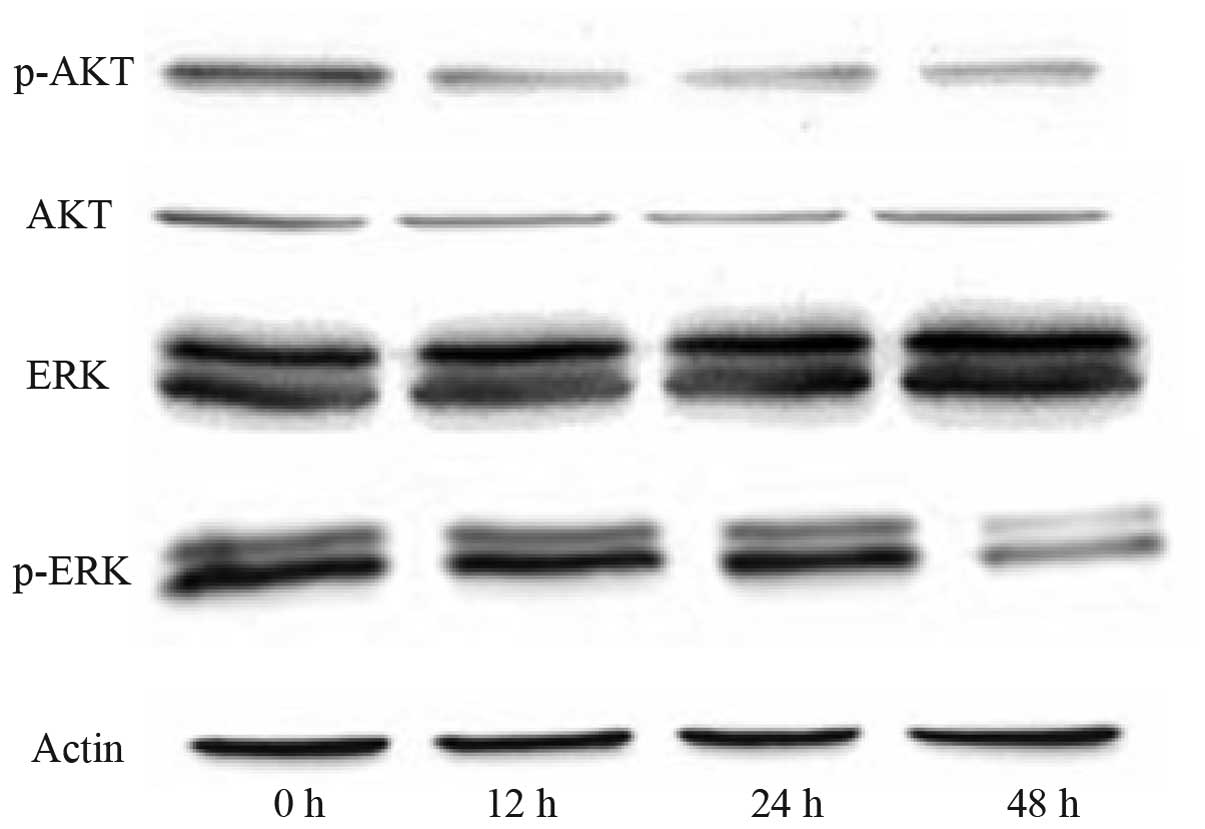|
1
|
Stewart BW and Kleihues P: World Cancer
Report. IARC press; Lyon: 2003
|
|
2
|
Mao Y, Xu J, Li Z, Zhang N, Yin H and Liu
Z: The role of nuclear β-catenin accumulation in the Twist2-induced
ovarian cancer EMT. PLoS One. 8:e782002013. View Article : Google Scholar
|
|
3
|
Fazioli F and Blasi F: Urokinase-type
plasminogen activator and its receptor: new targets for
anti-metastatic therapy? Trends Pharmacol Sci. 15:25–29. 1994.
View Article : Google Scholar : PubMed/NCBI
|
|
4
|
Mekkawy AH, Pourgholami MH and Morris DL:
Involvement of urokinase-type plasminogen activator system in
cancer: an overview. Med Res Rev. 34:918–956. 2014. View Article : Google Scholar : PubMed/NCBI
|
|
5
|
Andreasen PA, Kjøller L, Christensen L and
Duffy MJ: The urokinase-type plasminogen activator system in cancer
metastasis: a review. Int J Cancer. 72:1–22. 1997. View Article : Google Scholar : PubMed/NCBI
|
|
6
|
Kwaan HC: The plasminogen-plasmin system
in malignancy. Cancer Metastasis Rev. 11:291–311. 1992. View Article : Google Scholar : PubMed/NCBI
|
|
7
|
Berkenblit A, Matulonis UA, Kroener JF,
Dezube BJ, Lam GN, Cuasay LC, Brünner N, Jones TR, Silverman MH and
Gold MA: A6, a urokinase plasminogen activator (uPA)-derived
peptide in patients with advanced gynecologic cancer: a phase I
trial. Gynecol Oncol. 99:50–57. 2005. View Article : Google Scholar : PubMed/NCBI
|
|
8
|
Ghamande SA, Silverman MH, Huh W, Behbakht
K, Ball G, Cuasay L, Würtz SO, Brunner N and Gold MA: A phase 2,
randomized, double-blind, placebo-controlled trial of clinical
activity and safety of subcutaneous A6 in women with asymptomatic
CA125 progression after first-line chemotherapy of epithelial
ovarian cancer. Gynecol Oncol. 111:89–94. 2008. View Article : Google Scholar : PubMed/NCBI
|
|
9
|
Gold MA, Brady WE, Lankes HA, Rose PG,
Kelley JL, De Geest K, Crispens MA, Resnick KE and Howell SB: A
phase II study of a urokinase-derived peptide (A6) in the treatment
of persistent or recurrent epithelial ovarian, fallopian tube, or
primary peritoneal carcinoma: a Gynecologic Oncology Group study.
Gynecol Oncol. 125:635–639. 2012. View Article : Google Scholar : PubMed/NCBI
|
|
10
|
Heinemann V, Ebert MP, Laubender RP, Bevan
P, Mala C and Boeck S: Phase II randomised proof-of-concept study
of the urokinase inhibitor upamostat (WX-671) in combination with
gemcitabine compared with gemcitabine alone in patients with
non-resectable, locally advanced pancreatic cancer. Br J Cancer.
108:766–770. 2013. View Article : Google Scholar : PubMed/NCBI
|
|
11
|
Chen H, Hao J, Wang L and Li Y:
Coexpression of invasive markers (uPA, CD44) and multiple
drug-resistance proteins (MDR1, MRP2) is correlated with epithelial
ovarian cancer progression. Br J Cancer. 101:432–440. 2009.
View Article : Google Scholar : PubMed/NCBI
|
|
12
|
Wang L, Madigan MC, Chen H, Liu F,
Patterson KI, Beretov J, O'Brien PM and Li Y: Expression of
urokinase plasminogen activator and its receptor in advanced
epithelial ovarian cancer patients. Gynecol Oncol. 114:265–272.
2009. View Article : Google Scholar : PubMed/NCBI
|
|
13
|
Dorn J, Harbeck N, Kates R, Gkazepis A,
Scorilas A, Soos-aipillai A, Diamandis E, Kiechle M, Schmalfeldt B
and Schmitt M: Impact of expression differences of
kallikrein-related peptidases and of uPA and PAI-1 between primary
tumor and omentum metastasis in advanced ovarian cancer. Ann Oncol.
22:877–883. 2011. View Article : Google Scholar
|
|
14
|
Salameh MA, Robinson JL, Navaneetham D,
Sinha D, Madden BJ, Walsh PN and Radisky ES: The amyloid precursor
protein/protease nexin 2 Kunitz inhibitor domain is a highly
specific substrate of mesotrypsin. J Biol Chem. 285:1939–1949.
2010. View Article : Google Scholar :
|
|
15
|
Zhao L and Yan W: Expression and
identification of recombinant humanuPA17-KPI in Pichia pastoris.
Chin J Lab Diagn. 14:1685–1688. 2010.
|
|
16
|
Lai KC, Huang AC, Hsu SC, Kuo CL, Yang JS,
Wu SH and Chung JG: Benzyl isothiocyanate (BITC) inhibits migration
and invasion of human colon cancer HT29 cells by inhibiting matrix
metalloproteinase-2/-9 and urokinase plasminogen (uPA) through PKC
and MAPK signaling pathway. J Agric Food Chem. 58:2935–2942. 2010.
View Article : Google Scholar : PubMed/NCBI
|
|
17
|
Lin Y, Cui M, Xu T, Yu W and Zhang L:
Silencing of cyclooxy-genase-2 inhibits the growth, invasion and
migration of ovarian cancer cells. Mol Med Rep. 9:2499–2504.
2014.PubMed/NCBI
|
|
18
|
Vergara D, Merlot B, Lucot JP, Collinet P,
Vinatier D, Fournier I and Salzet M: Epithelial-mesenchymal
transition in ovarian cancer. Cancer Lett. 291:59–66. 2010.
View Article : Google Scholar
|
|
19
|
Evans DM and Lin PL: Suppression of
pulmonary metastases of rat mammary cancer by recombinant urokinase
plasminogen activator inhibitor. Am Surg. 61:692–696; discussion
696–697. 1995.PubMed/NCBI
|
|
20
|
Praus M, Wauterickx K, Collen D and Gerard
RD: Reduction of tumor cell migration and metastasis by adenoviral
gene transfer of plasminogen activator inhibitors. Gene Ther.
6:227–236. 1999. View Article : Google Scholar : PubMed/NCBI
|
|
21
|
Guo Y, Higazi AA, Arakelian A, Sachais BS,
Cines D, Goldfarb RH, Jones TR, Kwaan H, Mazar AP and Rabbani SA: A
peptide derived from the nonreceptor binding region of urokinase
plasminogen activator (uPA) inhibits tumor progression and
angiogenesis and induces tumor cell death in vivo. FASEB J.
14:1400–1410. 2000. View Article : Google Scholar : PubMed/NCBI
|
|
22
|
Guo Y, Mazar AP, Lebrun JJ and Rabbani SA:
An antiangiogenic urokinase-derived peptide combined with tamoxifen
decreases tumor growth and metastasis in a syngeneic model of
breast cancer. Cancer Res. 62:4678–4684. 2002.PubMed/NCBI
|
|
23
|
Ploug M, Østergaard S, Gårdsvoll H,
Kovalski K, Holst-Hansen C, Holm A, Ossowski L and Danø K:
Peptide-derived antagonists of the urokinase receptor. Affinity
maturation by combinatorial chemistry, identification of functional
epitopes, and inhibitory effect on cancer cell intravasation.
Biochemistry. 40:12157–12168. 2001. View Article : Google Scholar : PubMed/NCBI
|
|
24
|
Zaravinos A: The regulatory role of
MicroRNAs in EMT and cancer. J Oncol. 2015(865816)2015. View Article : Google Scholar : PubMed/NCBI
|
|
25
|
Chandrasekar N, Mohanam S, Gujrati M,
Olivero WC, Dinh DH and Rao JS: Downregulation of uPA inhibits
migration and PI3k/Akt signaling in glioblastoma cells. Oncogene.
22:392–400. 2003. View Article : Google Scholar : PubMed/NCBI
|
|
26
|
Wang Q, Wang Y, Zhang Y, Zhang Y and Xiao
W: The role of uPAR in epithelial-mesenchymal transition in small
airway epithelium of patients with chronic obstructive pulmonary
disease. Respir Res. 14(67)2013. View Article : Google Scholar
|
|
27
|
Jankun J and Skrzypczak-Jankun E:
Molecular basis of specific inhibition of urokinase plasminogen
activator by amiloride. Cancer Biochem Biophys. 17:109–123.
1999.
|
|
28
|
Matthews H, Ranson M and Kelso MJ:
Anti-tumour/metastasis effects of the potassium-sparing diuretic
amiloride: an orally active anti-cancer drug waiting for its
call-of-duty? Int J Cancer. 129:2051–2061. 2011. View Article : Google Scholar : PubMed/NCBI
|
|
29
|
Lester RD, Jo M, Montel V, Takimoto S and
Gonias SL: uPAR induces epithelial-mesenchymal transition in
hypoxic breast cancer cells. J Cell Biol. 178:425–436. 2007.
View Article : Google Scholar : PubMed/NCBI
|
|
30
|
Liu SQ, Huang JA, Qin MB, Su YJ, Lai MY,
Jiang HX and Tang GD: Sphingosine kinase 1 enhances colon cancer
cell proliferation and invasion by upregulating the production of
MMP-2/9 and uPA via MAPK pathways. Int J Colorectal Dis.
27:1569–1578. 2012. View Article : Google Scholar : PubMed/NCBI
|
|
31
|
Chou RH, Hsieh SC, Yu YL, Huang MH, Huang
YC and Hsieh YH: Fisetin inhibits migration and invasion of human
cervical cancer cells by down-regulating urokinase plasminogen
activator expression through suppressing the p38 MAPK-dependent
NF-κB signaling pathway. PLoS One. 8:e719832013. View Article : Google Scholar
|
|
32
|
Jo M, Lester RD, Montel V, Eastman B,
Takimoto S and Gonias SL: Reversibility of epithelial-mesenchymal
transition (EMT) induced in breast cancer cells by activation of
urokinase receptor-dependent cell signaling. J Biol Chem.
284:22825–22833. 2009. View Article : Google Scholar : PubMed/NCBI
|
|
33
|
Blasi F and Sidenius N: The urokinase
receptor: focused cell surface proteolysis, cell adhesion and
signaling. FEBS Lett. 584:1923–1930. 2010. View Article : Google Scholar
|
|
34
|
Eastman BM, Jo M, Webb DL, Takimoto S and
Gonias SL: A transformation in the mechanism by which the urokinase
receptor signals provides a selection advantage for estrogen
receptor-expressing breast cancer cells in the absence of estrogen.
Cell Signal. 24:1847–1855. 2012. View Article : Google Scholar : PubMed/NCBI
|
|
35
|
Nowicki TS, Zhao H, Darzynkiewicz Z,
Moscatello A, Shin E, Schantz S, Tiwari RK and Geliebter J:
Downregulation of uPAR inhibits migration, invasion, proliferation,
FAK/PI3K/Akt signaling and induces senescence in papillary thyroid
carcinoma cells. Cell Cycle. 10:100–107. 2011. View Article : Google Scholar :
|
|
36
|
Gogineni VR, Gupta R, Nalla AK, Velpula KK
and Rao JS: uPAR and cathepsin B shRNA impedes TGF-β1-driven
proliferation and invasion of meningioma cells in a XIAP-dependent
pathway. Cell Death Dis. 3:e4392012. View Article : Google Scholar
|
|
37
|
Shetty S, Rao GN, Cines DB and Bdeir K:
Urokinase induces activation of STAT3 in lung epithelial cells. Am
J Physiol Lung Cell Mol Physiol. 291:L772–L780. 2006. View Article : Google Scholar : PubMed/NCBI
|
|
38
|
Stewart AG, Xia YC, Harris T, Royce S,
Hamilton JA and Schuliga M: Plasminogen-stimulated airway smooth
muscle cell proliferation is mediated by urokinase and annexin A2,
involving plasmin-activated cell signalling. Br J Pharmacol.
170:1421–1435. 2013. View Article : Google Scholar : PubMed/NCBI
|
|
39
|
Ulisse S, Baldini E, Sorrenti S and
D'Armiento M: The urokinase plasminogen activator system: a target
for anti-cancer therapy. Curr Cancer Drug Targets. 9:32–71. 2009.
View Article : Google Scholar : PubMed/NCBI
|
|
40
|
Santarpia L, Lippman SM and El-Naggar AK:
Targeting the MAPK-RAS-RAF signaling pathway in cancer therapy.
Expert Opin Ther Targets. 16:103–119. 2012. View Article : Google Scholar : PubMed/NCBI
|
|
41
|
Romano G: The role of the dysfunctional
akt-related pathway in cancer: establishment and maintenance of a
malignant cell phenotype, resistance to therapy, and future
strategies for drug development. Scientifica (Cairo).
2013:3171862013.
|















